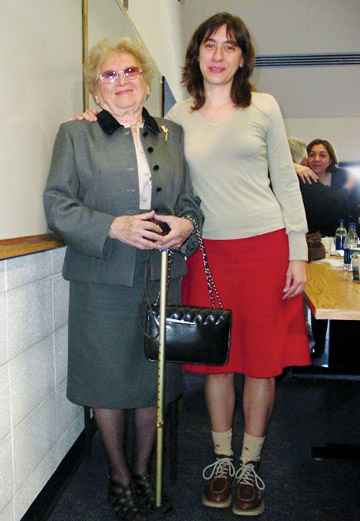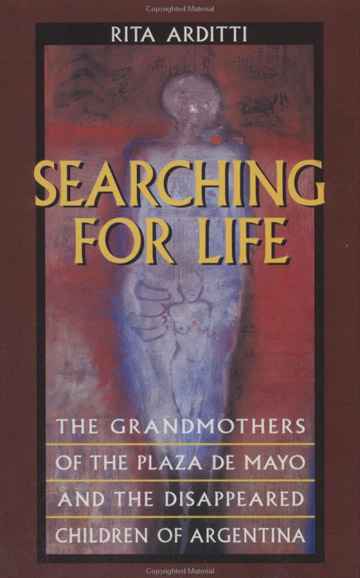Disappeared and Reunited: The Grandmothers of the Plaza de Mayo

(Left) Rosa Tarlovsky de Roisinbilt, vice president of the Grandmothers, stands with her granddaughter, Mariana Perez, director of the investigative arm of the group. – Photo by Mimi Yeh
April 28, 2004
It was a silent audience that watched the “Sixty Minutes” documentary on Argentina’s “Dirty War” and heard the story of the “disappeared,” the estimated 30,000 people who vanished under a dictatorship that lasted from 1976 to 1983. However, the tale of human destruction spans two generations. Some pregnant women taken by the government were allowed to give birth before they were killed. Mothers with young children were also kidnapped. Some of the progeny were given to the members of the military who had been responsible for their parents’ execution, while others were adopted legitimately by families who had no idea of the circumstances which orphaned their chosen children. Now the Grandmothers of the Plaza de Mayo, a human rights organization formed by the parents of the disappeared, seek to find the whereabouts of an estimated 500 lost grandchildren.
Rosa Tarlovsky de Roisinbilt, vice president of the Grandmothers of the Plaza de Mayo, Rita Arditti, author of Searching for Life: The Grandmothers of the Plaza de Mayo and the Disappeared Children of Argentina, and Mariana Perez, granddaughter of Roisinbilt, director of the investigative arm of the Grandmothers and herself a daughter of the disappeared, described their work in reuniting families on April 22 at UMass Boston.
The President of the Grandmothers, Estela Barnes de Carlotto, who was scheduled but unable to attend the lecture, and Roisinbilt were given honorary degrees in humane letters during the UMB commencement of 2000 in recognition of their work. Roisinbilt is also a member of the UMB Human Rights Working Group.
With Arditti translating for Roisinbilt and Perez, audience members were able to learn secrets about the “Dirty War” that had remained hidden for years. “In general, in Argentine society there were many doubts…Why did they take them away? They must have done something wrong,” said Roisinbilt about the reluctance of people to give credence to the horrific stories of stolen children and torture. “The great impetus we had for creating this group was when we learned not only our children would not be returned but also our grandchildren.”
Begun in 1977, the Grandmothers named their organization after the Plaza de Mayo where they would stand silently protesting the disappearances of their children. “Identity and memory-those are the two guiding principles of [the Grandmothers’] work,” stated Arditti, describing their purpose as that of recovery of the history of the disappeared so they are not just names or numbers.
They started out with no guidelines and no help whatsoever from the government. “We had to rely on our own creativity. We were like people waving our hand in the water, sinking in despair. But it worked, little by little various individuals…helped us in our work,” explained Roisinbilt to a rapt audience.
Although a few were adopted properly, the majority of children were given false birth certificates. For this reason, Roisinbilt vigorously opposed the use of the term “adopted.” “Our psychologists tell us that no possible love can be based on concealment and lies.”
Perez, whose missing brother was discovered in 2000, told of her own experiences, finding the truth of her own parentage, and meeting her grandmother for the first time at the age of ten. “Many young people like myself who are looking for brothers and sisters are working with the Grandmothers,” said Perez, bringing with them a unique perspective on how to inform the younger generation. It was this group who thought of taking “pictures of the grandmothers with different sports teams so those who only looked at the sports pages would be aware” and “posing abuelas with rock stars.”
To date, the Grandmothers have discovered the whereabouts of 77 children with a team of specially trained psychologists who help those found deal with the discovery, the National Genetic Databank, which allows them to store and verify DNA samples, and oral histories from family members and friends of the disappeared, to teach the children that are curious about the parents they never knew. There are 140 assigned cases currently being investigated and another 100 reported.
Although the government has since apologized for the atrocities committed, one wonders if absolution is possible. “Forgiveness is something one individual can give to another,” said Perez.












































































